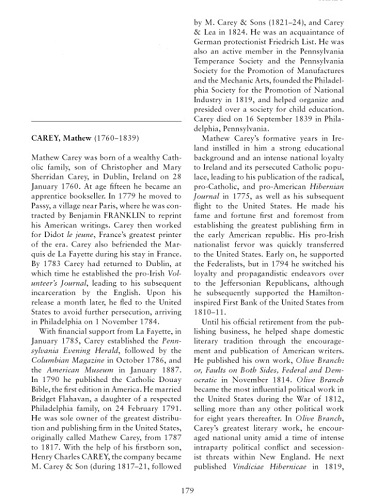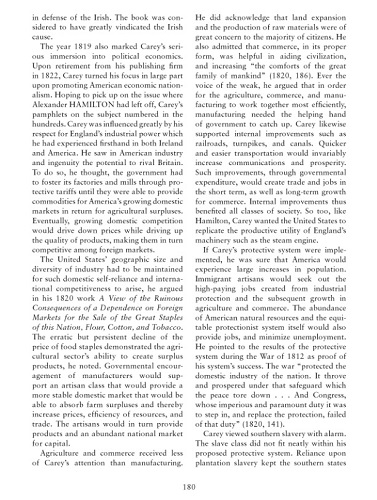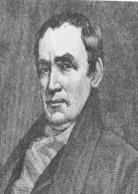Life
| 1760-1839; b. Summerhill, Dublin; the son of a successful baker, Christopher [and Mary Sherridan] Carey; apprenticed to a bookseller and the printing trade, 1775; he issued pamphlet opposing duelling, 1777; also A Letter to the Irish Catholics (1779), criticising severity of Penal Laws and resulting in his flight to Paris for a year under threat of prosecution; he was employed by Benjamin Franklin at his Paris printing office; returned to Ireland after a year, and ed. Freeman’s Journal and The Volunteer’s Journal (1783); prosecuted under a Bill introduced in the Irish House of Lords by John Foster (5th April 1784) declaring the Record [viz., V. Journal] ‘scandalous and seditious’; he emigrated to America and settled in Philadelphia, 1784, where he issued The Plagi-Scurriliad (1786), a Hudibrastic poem attaching the Irish administration; m. Bridget Flahavan, 24 Feb. 1791; |
|
||
| fnd. the Pennsylvania Herald, Columbian Magazine, and American Museum, all unprofitable; lent money by General Lafayette to set up as printer and bookseller Philadelphia; c.1795; wrote frequently on politics and society and reported on debates in the state legislature; a founding-member of the American Sunday-School Society, he published the first American editions of the Douay [Douai] and King James Bibles; issued Vindiciae Hiberniae (Philadelphia 1819), drawing heavily on Spenser, Arthur Young, et al. - but chiefly Thomas Newenham, and incorporating a vindication of the 1641 Rebellion; title poss. modelled on the Vindiciae Hiberniae of Sir Phillip Beare-O’Sullivan; his other works incl. Don Juan, or the Libertine Destroyed (1787), a 2-act tragic panto, and The Porcupiniad (1799), presum. inspired by Cobbett; his br. William Carey publ. Carey’s Atlas of America; a son Henry Carey became a well-known economist. | |||
| Carey handed over the business to his son Henry C. Carey, 1825, Henry joined by his brother-in-law Isaac Lea; Carey and Lea produced the Encylopedia Americana and a German dictionary, &c.; on Henry’s retirement in 1846, the firm became Lea and Blanchard and afterwards Lea Bros. & Co. ODNB PI DIW OCAL | |||
| [ top ] | |||
| Works |
| Chief works |
|
| See also Carey’s Autobiography (NY: E. L. Schwaab 1942). |
| Journals |
|
| Miscellaneous |
|
| See COPAC notes, under References, infra; available at Gale Group / Publications [online]. |
|
||||||
See also a single-sheet advertisement in four parts (1788) - 1] Thomas Seddon, Imported from London: A Large Assortment of New Music [… &c.] (recto at head); 2] William McKee, offering patent medicine for sale at the premises of the bookseller Matthew Carey (foot of recto); 3] the current issue of the American Museum, published by Matthew Carey, July 1788 (verso at head); John Hague, American manufacture of his machines with a recommendation signed by Samuel Wetherill, Jr., and other members of the Manufacturing Committee for American Products, 7 April, 1788 (verso at foot) [ESTCat. W42989]
Riposte?: Vindiciae Hibernicae: An Historical Argument to Prove Ireland Not a Conquered Country … By a clergyman of the Church of England […] (London: J. Ridgway & Son 1838), 128pp. [cited in Yale UP Orbis Catalogue] appears to be a riposte to Carey’s Vindiciae Hibernicae.
[ top ]
Criticism
|
|
|
|
[ top ]
Commentary
Thomas Davis, ‘The Young Irishman of the Middle Classes’, lecture to the TCD Historical Society, 1839; reprinted in three instalments in The Nation, 1848, where Davis says, ‘With rare exceptions, national history does dramatic justice, alien history is the inspiration of the traitor’ [… &c.], with a footnote reading: ‘I mean the histories of a country, by hostile strangers. They should be refuted and then forgotten. Such are most histories of Ireland, and yet Irishmen neglect the original documents and such compilations as Carey’s Vindiciae; and they sin not by omission only - too many of them receive and propagate on Irish affairs quicquid Anglo mendax in historia audet’. (See The Field Day Anthology of Irish Writing, gen. ed., Seamus Deane, Derry: Field Day 1991, Vol. 1; extract from Davis; as infra.)
[ top ]
See also Marc-William Palen, ‘Mathew Carey’, in Dictionary of Early American Philosophers, ed. John R. Shook (USA: Bloomsbury Publ 2012) [1,128pp.], pp.179-81 - as attached—

|

|
|
[ top ]
Quotations
Vindiciae Hiberniae (Philadelphia 1819): ‘[T]hose superior spirits, who scorn the yoke of fraud, imposture, bigotry, and delusion; who, at the sacred shrine of truth, will offer up their prejudices, how inveterate soever, when her bright torch illuminates their minds; who, possessing the inestimable blessing of thrice-holy and revered liberty, acquired by an arduous struggle against a mere incipient despotism, will sympathise with those who contended ardently, although unsuccessfully, against as grievous an oppression as ever pressed to earth a noble and generous nation, which embarked in the same glorious cause as Leonidas, Epaminondas, Brutus, the prince of Orange, William Tell, Fayette, Hancock, Adams, Franklin, and Washington […]. It is likewise dedicated to the immortal memory of the Desmonds, the O’Nials, the O’Donnels, the O’Moores, the Prestons, the Mountgarrets, the Castlehavens, the Fitzgeralds, the Sheareses, the Tones, the Emmetts [sic], and the Myriads of illustrious Irishmen, who sacrificed life or fortune, in the unsuccessful effort to emancipate a country endowed by heaven with as many and as choice blessings as any part of the terraqueous globe, but, for ages, a hopeless and helpless victim to a form of government transcendently pernicious.’ (Carey, op. cit, p.[iii]; quoted in Joseph Th. Leerssen, Mere Irish & Fior-Ghael, Amsterdam: John Benjamins Pub. Co. 1986, p.440.)
[ top ]
| So commodious ... |
View of the very great natural advantages of Ireland and of the cruel policy pursued for centuries, towards that island, whereby those advantages have been blasted: to which is added, a sketch of the present deplorable condition of the Irish peasantry ... by M. Carey ... (Philadelphia: H. C. Carey & I. Lea 1823). |
| Carey prefixes the following quotations from Spenser [given as Spencer], Davies and Browne (inter alia) to his text: |
|
| Cf. James Joyce, Finnegans Wake: ‘... by a commodius vicus of recirculation ...’ [003.03]. |
See also Fynes Moryson’s Itinerary, Book III, Chap. V [Of Ireland:] ‘... the seventh County hath the name of the City Watterford, which the Irish call Porthlargi, of the commodious Haven, a rich and well inhabited City, esteemed the second to Dublyn. And because the Inhabitants long faithfully helped the English in subduing Ireland, our King gave them excessive priviledges, but they rashly failing in their obedience, at King James and his Comming to the Crowne, could not in long time obtain the confirmation of their Charter. [...]’ (Maclehose Edn., Glasgow 1908, p.187) - available at Internet Archive - online. |
See also Spenser’s View: ‘[...] so goodly and commodious a soil [...] commodiously [19] commodious Pale [18-19], &c. (A View of the Present State of Ireland, ed. C. L. Renwick, OUP 1970). |
[ top ]
References
Dictionary of National Biography describes Vindiciae Hiberniae as a text ‘extenuating 1641’- i.e., as making excuses for the supposed crime of that insurgency against the Protestant plantation of Ulster.
D. J. O’Donoghue, The Poets of Ireland: A Biographical Dictionary (Dublin: Hodges Figgis & Co 1912); b. Summerhill, son of a baker; A Letter to the Irish Catholics necessitated his flight to Paris for a year; ed. Freeman’s Journal, Dublin, and started Volunteer Record (1783); fled to America, 1784; resumed printing in Philadelphia; his son Henry Carey was prominent economist; The Plagi-Scurriliad (Philadelphia 1786), a Hudibrastic poem; other works incl. Don Juan, or the Libertine Destroyed, tragic pantomical entertainment in 2 acts (1787); The Porcupiniad (1799) [and note that Cobbett’s American paper was called Porcupine’s Gazette; and see his The Life and Adventures of Peter Porcupine, 1796].
Richard Cargill Cole, ‘Irish Booksellers in America, Phases I and II, 1750-1794’ [Chap. 3], Irish Booksellers and English Writers 1740-1800 (London: Mansell Pub.; NJ: Atlantic Heights 1986), deals with Carey’s purchase of Dublin printed volumes of Patrick Byrne for successful distribution in America, &c. Bibl. Carey’s Autobiograph[y] (NY: E. L. Schwaab 1942); Earl L. Bradsher, Mathew Carey: Editor Author, and Publisher (NY: Columbia UP 1912); [?] Tebbel, The History of Book Publishing, I [q.d.], pp.106-17; William Clarkin, Mathew Carey: A Bibliography of His Publications (NY: Garland 1984).
Brian Cleeve & Anne Brady, A Dictionary of Irish Writers (Dublin: Lilliput 1985); b. Dublin 1790; founded Pennsylvania Herald, 1785; published Care y’s American Atlas (1795), the first in America; wrote Hibernia Vindiciae, or Ireland Vindicated (1819) [err. for Vindiciae Hiberniae]; attempt to counter biased histories of Borlase, Hume, and others.
James D. Hart, The Oxford Companion to American Literature [5th edn.] (Oxford: OUP 1983): ‘was born Ireland’; worked in Franklin’s printing office at Passy, France; afterwards edited Volunteer’s Journal, militating against English rule in Ireland; escaped to America, 1784; ed. Pennsylvania Herald, The American Museum, and The Columbian Magazine; issued books incl. a vivid pamphlet on yellow fever epidemic in 1793 (Plagi-Scurriliad, supra); The Porcupiniad, a Hudibrastic Poem (1796), one of his attacks on Cobbett; The Olive Branch (1814), a plea for reconciliation after 1812; addresses for promotion of national industry, arguing for protectionist policies; Miscellaneous Essays (1830), vigorous example of his writing; Autobiographical Sketches (1829). Father of Henry Charles Carey (1793-1879), author of Essay on the Rate of Wages (1835), laissez-faire; and Principles of Political Economy (3 vols. 1837-40); The Past, the Present, and the Future (1848, championed protective tariff; Harmony of Interests (1861), same; The Principles of Social Science (3 vols. 1858-59) stresses analogy between natural and social sciences.
Seamus Deane, The Field Day Anthology of Irish Writing (Derry: Field Day 1991), Vol. 1, footnote to ref. in Thomas Davis: ‘Matthew Carey 1760-1839, bookseller and pamphleteer in Dublin, Paris, and Philadelphia, published Vindiciae Hiberniciae in 1819 to refute accepted views of the Irish Rebellion in 1641.’
[ top ]
Catalogues
COPAC lists miscellaneous [as above]. Also supplies notes on The Volunteer’s Journal; or; Irish Herald [tri-weekly] (Dublin: printed for the proprietors, by William Corbett, No. 196, Abbey-Street, within five houses of Capel-Street, where advertisements, essays &, are taken in [1783- ], with notes: Originated by Carey with financial support from his father Christopher and some assistance from William Bingley; taken over by his brother Thomas and the printer James Dowling after Carey’s arrest for anti-government activity. Dowling charged both Carey sons with treason and sold his paper to William Nicholson in early 1785, but continued as printer. Matthew later escaped to the United States (Vide [Mary] Pollard). Cut in centre of title: an Irish harp, surmounted by a crown, with soldiers on either side and motto below: Libertas et natale solum. Imprint from colophon; later issues have added a publishing note below title: ‘Printed and published at No. 7, Dame-Street, corner of Palace-Street.’ Var. printers, viz., Pat. Donnelly (Dec. 1783 ); J[ames] Dowling, no. 46, College-Green (1784) and Dowling at another address (1785); years of publication from dates of issues. The Journal was a radical anti-government paper, vigorously prosecuted in 1784-1785 by Dublin Castle which several times arrested or imprisoned its various publishers; probably ceased publication in 1786. Contents include news of the Irish Parliament, attacks on the government, lottery announcements, new books published and other advertisements, occasionally illustrated with small cuts. See Brian Inglis (Irish Newspapers). Issues incl. No. 2. (Wednesday, 15 Oct 1783); latest extant issue, No. 451 (28 Aug. 1786). Occasional supplements given Gratis. The Volunteer journal: or, Irish advertiser was a competing publication published by Christopher Carey while his sons were in jail; his right to the new paper was disputed by James Dowling. [ESTC Citation no. P2227.]
Yale University Library gives bio-dates 1760-1839 and lists 278 entries incl. very many ‘Addresses’ to the Philadelphia Society on industry, agriculture and so forth,as well as ‘American Museum or Universal Magazine’ and ‘American Remembrancer or An Impartial Collection of Essays Resolve, Speeches, &c. Relative, or having affinity, to the treaty with Great Britain (Philadelphia: H. Tuckniss for M. Carey 1795). Also, Vindiciae Hibernicae, or, Ireland vindicated: an attempt to develop and expose a few of the multifarious errors and falsehoods respecting Ireland …: particularly in the legendary tales of the conspiracy and pretended massacre of 1641 (Philadelphia: M. Carey & Son 1819), xxxvi [17], 504pp. [8], 22cm. (Yale UP). NOTE Vinculae [?err. for Vindiciae] Hiberniae (Phil. 1823), copy in Library of Herbert Bell (Belfast).
Virginia Centre for Digital History (Univ. of Virginia) - Lewis and Clark archive & project - biography of Matthew Carey: Born to a middle-class Irish family in Dublin in 1760, Matthew Carey entered the bookselling and printing business in 1775. At 17 years old, he published a pamphlet criticizing the merits of dueling. He followed it shortly thereafter with a pamphlet criticizing the severity of the Irish penal code. Authorities threatened Carey with prosecution, which caused him to move to Paris in 1779 to avoid arrest. He met Dr. Benjamin Franklin there, who hired Carey to work in his own printing office. Carey worked for Franklin for a year before returning to Ireland where he edited The Freeman’s Journal and The Volunteer’s Journal, two politically polemic publications. He fled Ireland for good in 1784, and settled in the United States as the nascent country was settling into its role as a nation free of English rule, an identity desired but unshared by the Irish. / Upon his arrival in Philadelphia, General Lafayette lent him some money to establish himself, which Carey used to found a new publishing outfit and bookseller. He created the Pennsylvania Herald, Columbian Magazine, and American Museum, another magazine, none of which turned a profit. He printed the first American version of the Douay Bible, in addition to the King James version. He often wrote on social topics, discussed politics, and reported on debates in the state legislature. Carey was an original member of the American Sunday-School Society. / In 1825, Carey retired, leaving his business to his son, Henry C. Carey. The junior Carey’s brother-in-law, Isaac Lea joined the business with him. Under their direction, the publishing house became one of the most prominent in the country for several years, publishing such works as the Encylopedia Americana, and a dictionary of German lexicon under the name Carey and Lea. Matthew Carey died in 1839, and Henry Carey retired in 1846. The firm changed from Carey and Lea to Lea and Blanchard, then later to Lea Brothers and Company. (Bibl., Latham, Charles [cataloger], “Matthew Carey Letter, 1804”.) [See online.]
Belfast Linen Hall Library holds Vindiciae Hiberniae, some 500 closely-printed pages, issued by subscription in Philadelphia 1823 [but cf. Quotations, supra]. Carey takes English partisan historian of Ireland to task, notably Temple, Davies, Borlase, Carte, Leland, Rushworth, Clarendon, Macauley and Hume, casting doubts on reports of massacre of Protestants in 1641 in particular. Did it happen at all? He points out that the numbers of Protestants claim to have been brutally murder were greater than the total of Protestants in Ireland at the time.
Hyland Books (Cat. 219) lists Vindiciae Hibernicae; or, Ireland Vindicated: An Attempt to Develop and Expose a Few of the Mulifarious Errors and Falsehood Respecting Ireland (Philadelphia 1837), viii, 474pp.
[ top ]
Notes
Sir John Gilbert, In his History of Dublin (1865-67), John Gilbert writes that ‘[…] Carey’s elaborate Vindiciae Hibernicae (1819), a compendium of which was given to the public under the title of Memoir on Ireland, Native and Saxon, by the late Daniel O’Connell’; but note that O’Connell’s Memoir (Dublin: Duffy 1844) is clear derived from Carey’s work but makes no acknowledgement of the fact in the preface or elsewhere.
Hans Kohn (Nationalism: Its Meaning and History, rev. edn., NJ: Robert E. Kreiger Publ. 1965) remarks that Carey established the Volunteer’s Journal, aiming ‘to defend the Commerce, the Manufacturers, and the political rights of Ireland, against the oppression and encroachment of Britain.’ (pp.320-21).
[ top ]
